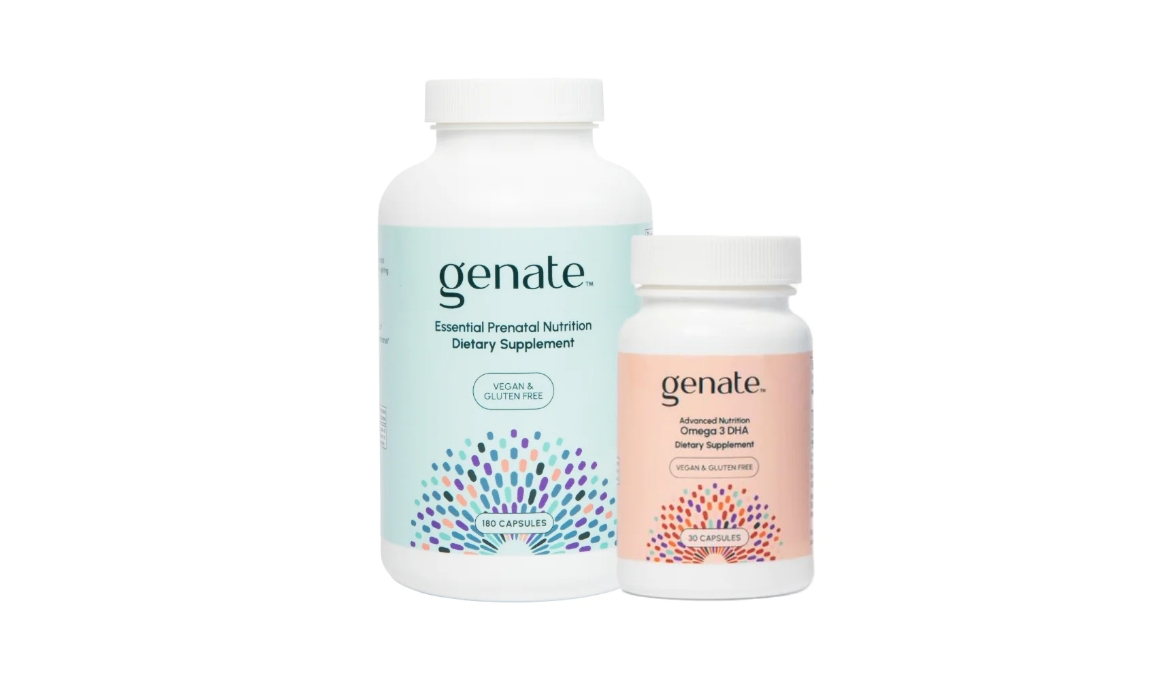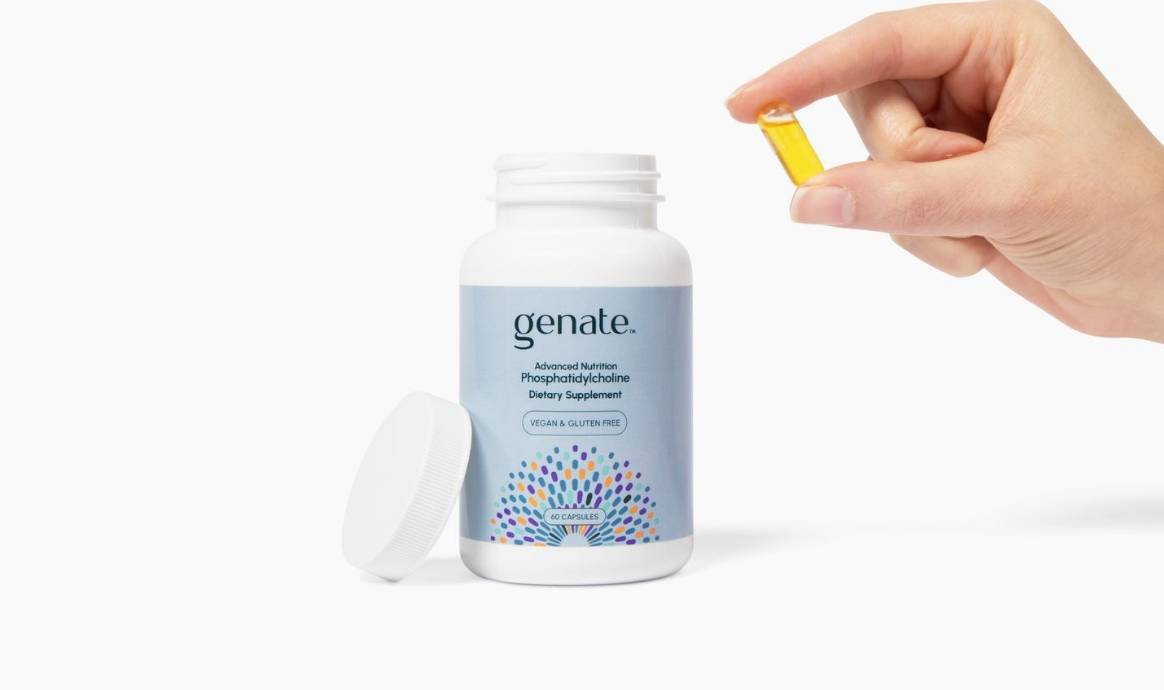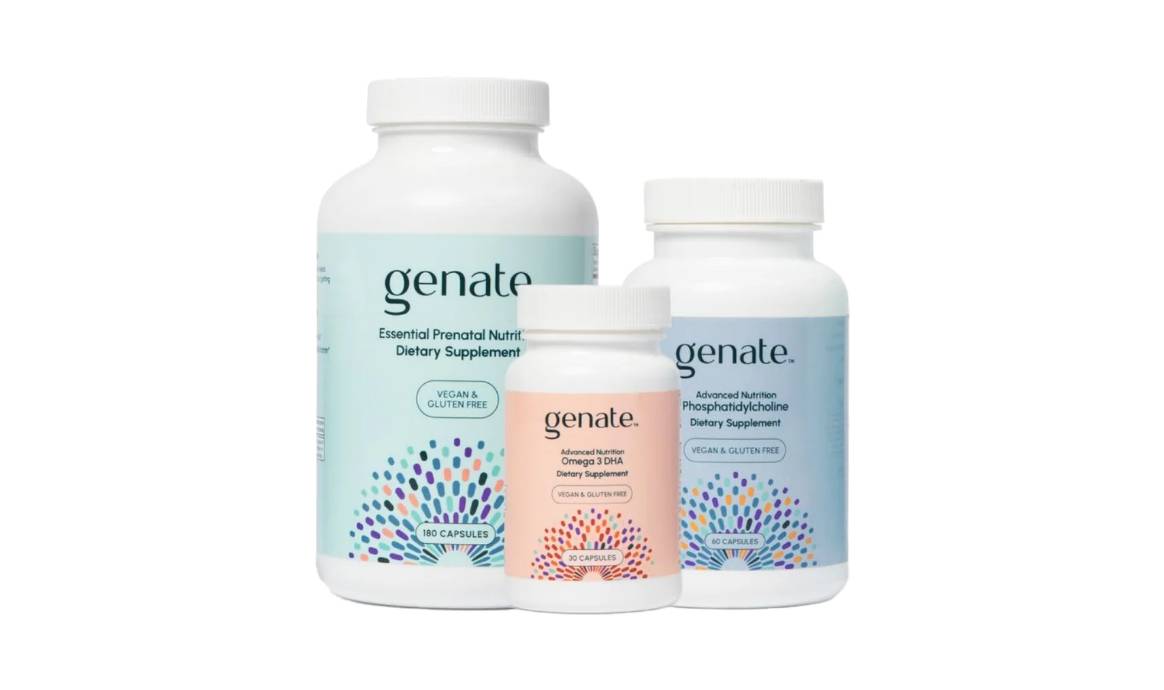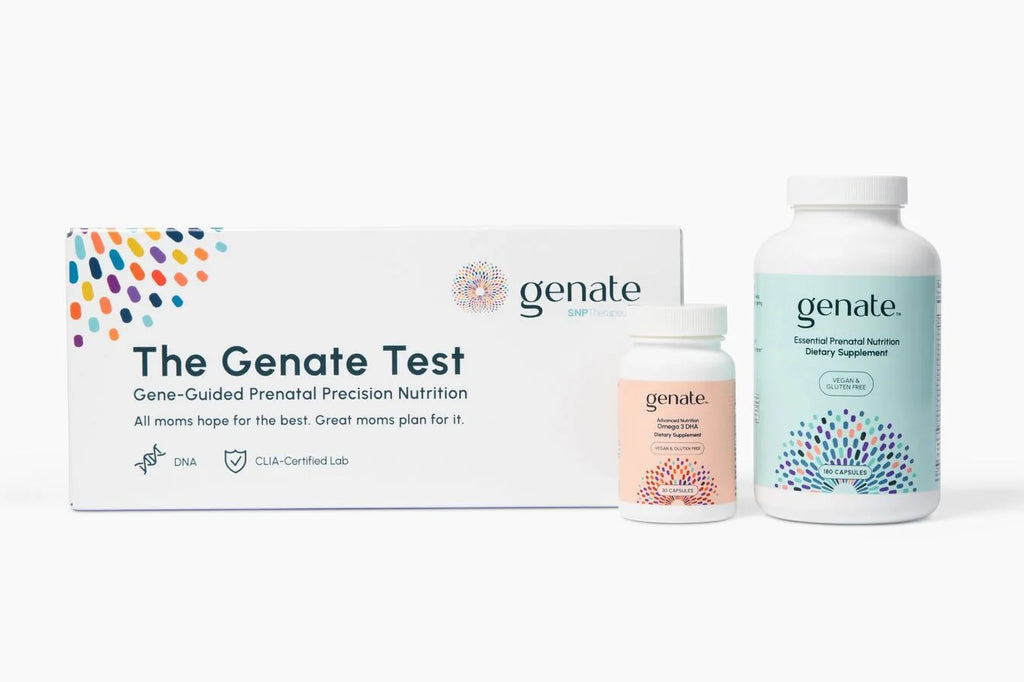Good nutrition is essential for every stage of your baby’s growth and development. But the efficiency with which your body metabolizes nutrients is partly determined by your genes, and common genetic variants can affect the metabolism of one-carbon nutrients that are critical for the development of your child’s brain and spinal cord. Genate Essential Prenatal Nutrition is a multivitamin formulated from academic research that provides women with a formulation optimized to support their baby’s cognitive development. It includes the one-carbon nutrients choline, betaine, methylfolate, and B vitamins that many women have trouble metabolizing and/or don’t get enough of in their diet.

PRENATALS
New Discoveries in Prenatal Nutrition: An Interview With Dr. Camille Hoffman
by Cara Everett, MS, RDN, LDN • May 9, 2024 • 6-7 minute read
In Part 1 of a two-part series, we talk with Dr. Camille Hoffman, OB/GYN physician and perinatal nutrition researcher at the University of Colorado, for the most up-to-date information on how prenatal nutrition affects fetal development and mental health.
What if there was a pregnancy nutrient that could:
- Help your child with their schoolwork for years after they’re born?
- Lower the risk of childhood behavioral and social problems?
- Support your and your child’s mental and emotional health?
Discover the genetics that affect your baby's cognitive development
Camille Hoffman, MD, MSc, is an OB/GYN and Professor of Maternal and Fetal Medicine at the University of Colorado School of Medicine. In addition to caring for patients, she conducts clinical studies on the links between prenatal nutrition, mental health, and fetal brain development. We sat down with Dr. Hoffman to learn about her latest research findings and how they can help moms, especially in light of what her team is discovering about a nutrient called choline.
Your Pregnancy Diet and Your Baby’s Brain
Health experts agree that good prenatal nutrition is one of the most important elements for proper fetal development. And when it comes to the brain and nervous system, we’re learning that it’s absolutely critical for your baby to get the nutrition they need.
Nutrients for brain formation must be present in the right amounts at the right times during pregnancy and the earliest days of life—or key developmental windows will be lost forever. [1]
While a wide variety of nutrients are important for a healthy pregnancy, one group in particular is critical for development of your baby’s brain and DNA synthesis. These are called one-carbon nutrients, and they include:
- Choline
- Phosphatidylcholine
- Betaine
- Folate
- Vitamins B6 and B12
Dr. Hoffman’s research focuses on one-carbon nutrients and how they affect the brain function and mental health of both babies and moms. Here she outlines the top prenatal nutrients needed for brain and organ development and explains why it’s important for moms to optimize their diets with one-carbon nutrients during pregnancy.
“All systems are developing. The brain is probably one of the most important for good quality of life, but you need single-carbon metabolism for all cell growth and division. You have a skeletal system to create. You've got the rest of the nervous system that connects to the brain to create. You have all organ systems that you are also using your nutrition to grow. And those systems all grow better with good nutrition than [they do] with inflammation and poor nutrition.”
How Does Choline Impact the Brain and Nervous System?
All one-carbon nutrients work together in the body in closely related pathways, but Hoffman and other researchers have found that one of the most important for both babies and moms is choline.[2]
Choline is required for:
- DNA methylation
- Cell membrane synthesis
- Development of the neural tube, brain, spinal cord, and nervous system
Choline is also the primary neurotransmitter for your baby before they’re born. Neurotransmitters act as the signals from nerve cells to other parts of the body, allowing them to communicate with each other.[3]
While choline is the main neurotransmitter in the fetus, it’s replaced by acetylcholine after birth.[4] Dr. Hoffman explains, “You can't go back once acetylcholine takes over and accomplish nearly what you could have if you've had choline there in the first place.”
This nutrient also has lifelong impacts on your baby’s memory by supporting the development of the hippocampus, which is the memory center of the brain. Animal studies show that maternal dietary choline intake in pregnancy is linked with irreversible, lifelong memory changes in offspring.[5] And human research has found that moms who are supplemented with choline during pregnancy have children who score better on cognitive tests up to 7 years of age.[6]
Hoffman says, “I often see babies that are growth restricted, so they're not growing well. And we have some data from our group that in that subset of participants, choline levels also helped, not with brain growth or fetal overall growth or birth weight, but with their neurodevelopmental scores after birth if choline levels were better.”
Her research has found that there is a key window of opportunity for choline to do its work in brain development.
“You really need choline present during second trimester brain development to form the foundation upon which to grow a well-connected brain. So if you miss that, a brain's still going to most likely grow and develop, but there may already be some wiring issues that you can't go back and rewire after the brain is formed.”
The second trimester is the key window for choline to impact your baby's brain development.
“And in our opinion, choline is preventative, because you're building the brain alongside it from scratch, versus everything else. Most healthcare is the treatment of something that already exists, but prevention is by far the most cost-effective, easiest path of least resistance. For something as simple as supplementation, there really isn’t a downside.”
After birth, it’s impossible to achieve the brain benefits choline could have provided during pregnancy.
Other Nutrients for Your Baby’s Brain
While choline should be at the top of your list of ingredients to look for in a prenatal vitamin, other pregnancy nutrients are also critical for brain development.
Hoffman says, “The other nutrients that we know are most important for fetal brains are omega-3 fats (DHA and EPA), vitamin D, vitamins A and E, and choline. Those are the main ones…for brain development. Folate as well is very critical, especially for early neural tube development, which is going to become the fetal brain and the entire central nervous system.”
You can get brain-building nutrients from the following foods:
Choline
Folate
DHA and EPA
Vitamin D
Vitamin A
Vitamin E
Beef liver, red meat, eggs, salmon, soy
Beef liver, spinach, black-eyed peas, fortified cereals, rice, asparagus, Brussels sprouts
Salmon, mackerel, sardines, herring, caviar
Salmon and other types of fish, fortified milks
Dairy foods, carrots, tomatoes, cantaloupe, sweet potatoes, butternut squash, pumpkin
Plant-based oils, nuts (almonds, hazelnuts, peanuts), sunflower seeds, beet greens, spinach, collard greens
Choline and Mental Health
Choline has striking effects not only on cognitive performance, but also on mental health for both babies and moms. For example, a study conducted by Hoffman’s group found that during pregnancy, women who consumed high doses of phosphatidylcholine (PC), a compound closely related to choline, gave birth to children with less social withdrawal and better attention spans than kids born to moms who received less PC.[7]
Hoffman’s research has also found that choline can help improve mood in mothers, especially when inflammation and/or stress are present. She said counseling and evaluation by a social worker are part of the prenatal care women receive in her pregnancy studies, and those factors also play an important role in maternal mood support.
“What we've found is that some psychological factors like stress, depression, anxiety, and history of trauma, do appear to affect the mental health of moms and babies. We also know that some of that is the nurture aspect. A mom or a family that has a strong history of mental illness or untreated mental illness is also going to influence their babies, their children, through the way that they raise them and nurture them. But all of those things are correlated with increased inflammatory markers, increased cortisol. And cortisol isn't a bad thing in and of itself. We need it to survive. We need it to be born, for our lungs to grow and develop, for multiple good things, but anything in excess can be problematic.
“So there's a lot of overlap and a lot of data, no matter if you're looking at cytokine levels, C-reactive protein levels, cortisol, immune function, BMI, all of the things that we know relate to inflammation, but there's a high correlation between [cortisol] and mood.”
Her research has found a link between choline and cortisol levels, at least in some populations. A 2021 study by Hoffmans’ group found that Black American pregnant women had lower choline levels than White women, and low choline in the first trimester was associated with increased cortisol, one indicator of stress and depression.[8] Research is ongoing to determine why cortisol levels rise in Black American women during pregnancy, and why that may be linked to low choline levels.
How Much Choline Do You Need?
It’s clear that choline has far-reaching effects for you and your baby. But how much do you need? National guidelines call for pregnant women to consume 450 mg of choline per day while pregnant and 550 mg while breastfeeding.[9]
You can find choline in foods such as beef, chicken, fish, eggs, and soy. The Genate Essential Prenatal Multivitamin is one of very few prenatal vitamins to include 450 mg of choline, and Genate Advanced Phosphatidylcholine contains 1800 mg phosphatidylcholine per serving (about 250 mg choline).
The Bottom Line
Pregnancy is an exciting time full of new experiences and more changes than most new moms anticipate, and Genate is here to help with reliable information on how prenatal nutrition impacts your health and that of your baby. Choline is one nutrient that can have lifelong effects on your baby’s brain health, and it’s most critical in the second trimester. Make sure you’re getting at least 450 mg choline per day through foods and/or supplements. Read our article on one-carbon metabolism to find food sources of choline and other one-carbon nutrients that are vital for your baby’s health.
Dr. Hoffman and her research group are at the forefront of studies in the field of prenatal nutrition, and we’re grateful for her work on behalf of moms and their babies. To learn more about how your genes affect your nutrition needs and the nutrients you share with your baby during pregnancy and breastfeeding, visit the Genate site.
This article is not intended as medical advice to treat or diagnose any health condition but rather as educational health information for the general public. It should not be used as a substitute for individualized medical care from your healthcare provider.
Shop the Article
Save 23% today!
Genate Essential Prenatal Multivitamin + Advanced Omega-3 DHA Package
Bundle to increase savings and provide the foundational nutrients needed for optimal health and development.
From $72 per month
Save 22% today!
Advanced Phosphatidylcholine
Our Phosphatidylcholine is vital for liver health and fat metabolism. It's needed in high amounts during pregnancy to support the development of your baby’s brain and spinal cord, cell membranes, nervous system, and DNA.
From $39 per month
Save 23% today!
Comprehensive Prenatal Support Package
Genate Essential Prenatal Multivitamin + Advanced Omega-3 DHA + Phosphatidylcholine
Our most comprehensive bundle - you’ll receive our Essential Prenatal Multivitamin, Advanced Phosphatidylcholine, and Advanced Omega-3 DHA.
From $110 per month

About Cara Everett, MS, RDN, LDN
Cara is a registered dietitian nutritionist with a passion for helping people optimize their health with sustainable diet and lifestyle changes. She provides nutrition counseling to clients of all ages, with specialties in nutrigenetics, women's health, and chronic medical conditions.
Cara is also a health writer and editor with over 20 years of experience creating content for print and digital media outlets, nutrition and wellness blogs, and medical white papers. Her work has been featured on websites such as the National Council on Aging, Everyday Health, HelpGuide, MarketWatch, and Verywell. Cara's current writing covers women's nutrition and nutrigenetics in pregnancy and lactation.
As the lead dietitian for SNP Therapeutics, Cara shapes content strategy, medically reviews and edits articles, and provides gene-focused medical nutrition therapy for clients. She holds Bachelor of Science and Master of Science degrees in Nutrition from Texas A&M University and completed her dietetic internship at the University of Kentucky Hospital.
References
- Schwarzenberg SJ, Georgieff MK, Daniels F, Corkins M, Golden NH, Kim JH, et al. Advocacy for improving nutrition in the first 1000 days to support childhood development and adult health. Pediatrics. 2018;141(2): e20173716. https://doi.org/10.1542/peds.2017-3716
- Choline. National Institutes of Health. https://ods.od.nih.gov/factsheets/Choline-Consumer/ Updated June 2, 2022. Accessed April 21, 2024.
- Neurotransmitters. Cleveland Clinic. https://my.clevelandclinic.org/health/articles/22513-neurotransmitters Updated March 14, 2022. Accessed April 21, 2024.
- Acetylcholine. Cleveland Clinic. https://my.clevelandclinic.org/health/articles/24568-acetylcholine-ach Updated December 30, 2022. Accessed April 21, 2024.
- Zeisel SH. Choline: critical role during fetal development and dietary requirements in adults. Annu Rev Nutr. 2006;26: 229-50. https://doi.org/10.1146/annurev.nutr.26.061505.111156
- Bahnfleth CL, Strupp BJ, Caudill MA, Canfield RL. Prenatal choline supplementation improves child sustained attention: A 7-year follow-up of a randomized controlled feeding trial. FASEB J. 2022;36(1):e22054. https://doi.org/10.1096/fj.202101217R
- Ross RG, Hunter SK, Hoffman MC, McCarthy L, Chambers BM, Law AJ, et al. Perinatal phosphatidylcholine supplementation and early childhood behavior problems: Evidence for CHRNA7 moderation. Am J Psych. 2016;173(5):509-16. https://doi.org/10.1176/appi.ajp.2015.15091188
- Hunter SK, Hoffman MC, McCarthy L, D'Alessandro A, Wyrwa A, Noonan K, et al. Black American maternal prenatal choline, offspring gestational age at birth, and developmental predisposition to mental illness. Schizophr Bull. 2021;47(4):896-905. https://doi.org/10.1093/schbul/sbaa171
- Dietary Guidelines for Americans, 2020-2025. 9th Edition. U.S. Department of Agriculture and U.S. Department of Health and Human Services. DietaryGuidelines.gov Published December 2020. Accessed April 24, 2024.
Take the Genate Quiz
Take our Nutrition Quiz to learn more about your nutrition journey.
Read Our Latest Articles
Frequently Asked Questions
What are the benefits of my baby getting the proper nutrients?
What are one-carbon nutrients and fatty acids, and why are they important?
One-carbon nutrients and fatty acids are critical for brain and spinal cord development during pregnancy and through the first two years of life. Although all nutrients are important, the one-carbon nutrients choline, folate, betaine, and B vitamins, along with the omega-3 fat DHA, provide the building blocks for proper growth of your developing baby's brain. Research at Cornell and Harvard universities has shown cognitive benefits for children born to mothers who received increased levels of one-carbon nutrients during pregnancy, demonstrating that optimal nutrition during pregnancy can have lasting effects for your baby.
If I buy Genate nutrition supplements, do I still need to take the test?
Genetic testing is a personal choice, and only you can decide what’s best for you and your baby. But the Genate Test is a powerful tool for optimizing your nutrition status, as it identifies genetically-caused metabolic inefficiencies that may influence your body’ ability to make and use the nutrients critical for your baby’s cognitive development. If you have SNPs in any of the nutrient pathways tested, your Genate Report will provide personalized recommendations for optimizing your nutrition. Our registered dietitians can show you how to fill in the gaps with foods and supplementation, if needed, to make sure you’re getting the nutrition you and your baby need.








